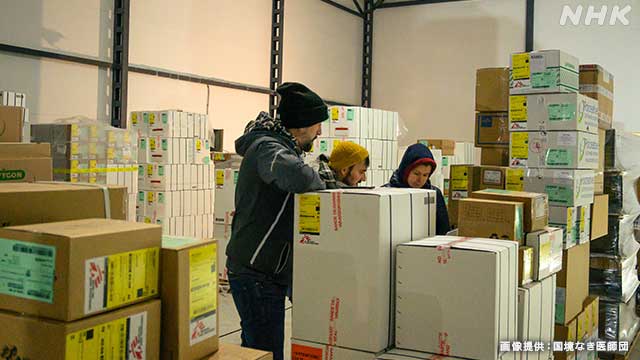"Deliver medical supplies is a battle against time,"
said Thomas Without Borders, Doctors Without Borders.
He talked about the situation of support in Ukraine, where the number of civilian casualties continues to increase due to fierce fighting.
What kind of activities are you doing locally?
As a public relations officer, I have been working locally since March 6th.
At first I was on the border between Poland and Ukraine, but I have been in Lviv since the 9th.
Doctors Without Borders currently has more than 100 staff working in and around Ukraine.
What kind of support do you have?
Currently, the main activity is to provide medical supplies such as medicines and medical equipment to Ukrainian hospitals.
I have a warehouse in Lviv and Dnipro to store medical supplies.
From there, we will provide insufficient supplies to the capital Kyiv and hospitals in the east.
Right now, we are prioritizing the eastern part, which is in a serious situation.
The supplies we are sending to various places now are medical instruments for surgery.
Since the beginning of the war, the number of patients requiring surgical treatment has increased, and the shortage of such medical equipment continues in the field.
It also makes it difficult for patients with chronic illnesses to continue treatment.
We also provide medicines for such patients.
We also send various remedies such as tuberculosis to the site.
What areas are particularly difficult to support?
According to the local situation from the staff in each area, Mariupol is the most serious situation.
I continue to live with little food or water.
It was difficult to contact the local staff, and when I talked to them a while ago, I heard that in Mariupol, many bodies were placed along the road and digging holes in the garden to bury them.
It has been reported that there are so many victims that the burial is too late.
What is the status of the Mariupol hospital?
It is said that hospitals and pharmacies are completely out of supplies such as medicines.
We have medical staff, but we cannot provide emergency medical care due to lack of supplies.
I am particularly worried about the children.
It seems that the infrastructure and communication network are cut off, and hospitals and water cannot be used as expected.
If water is not available for a long time, dehydration will occur.
And if you have diarrhea, there is a risk that your symptoms will get worse, and in the worst case you will die.
If this battle is prolonged, more people will not be treated and many lives will be at risk.
Attacks on residential areas and hospitals continue, and we have not been able to deliver medical supplies.
What are you worried about?
What we fear most is that this battle will continue, the front lines of war will expand, and what is happening in Mariupol will happen in other cities as well.
This causes further confusion.
Lviv, with its many internally displaced persons, is home to many humanitarian organizations, including Doctors Without Borders.
I think it's calmer than the cities in the east and south.
Even so, there are moments when I feel a war, such as an airstrike at a distance.
Locals are also afraid that the front lines of the war will change and approach us.
What kind of activities are planned in the future?
Currently, cities other than Mariupol are able to provide supplies.
For safety reasons, we are trying to send supplies to more hospitals before we can't go.
I am sending supplies as much as possible, but I think it is still not enough for the site.
Sending medical supplies to various parts of the country is no longer a battle against time.
I also think it will be important to provide medical care to refugees.
Activities within Ukraine and at the border will be important.
Many people in Ukraine are evacuating without carrying anything.
We have heard from staff in each region that many refugees are pregnant, and it is also an issue to secure a place where they can give birth safely.
Doctors Without Borders may have to consider how to provide a safe place.
I think it depends on what the war situation will be, but our activities will continue.

